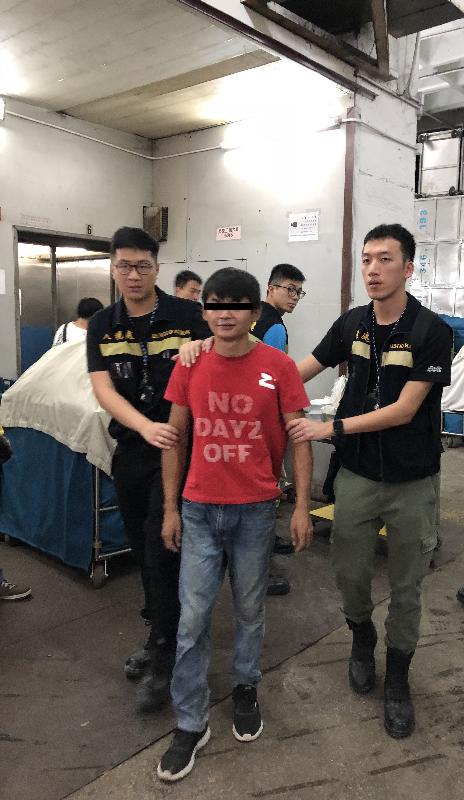Eight immigration offenders arrested (with photo)
The Immigration Department (ImmD) mounted a series of territory-wide enforcement operation codenamed "Twilight" and a joint operation codenamed "Windsand" with the Hong Kong Police Force yesterday (August 23) to combat illegal employment activities. A total of seven illegal workers and a suspected employer were arrested.
During operation "Twilight", ImmD Task Force officers raided two target locations including a restaurant and an industrial unit under renovation. Three illegal workers and an employer were arrested. The illegal workers comprised two men and one woman, aged 24 to 44. The woman was also suspected of using and being in possession of forged Hong Kong identity card. Meanwhile, the male employer, aged 50, was suspected of employing the illegal workers.
Furthermore, during operation "Windsand", four Mainland visitors comprising two men and two women, aged 22 to 42, were arrested for breaching their conditions of stay by being involved in suspected parallel goods trading at Ka Fu Close and San Wan Road in Sheung Shui. The goods included electronic products, food, daily necessities and skin-care products.
Since September 2012, a number of "Windsand" operations have been conducted, during which a total of 3 434 Mainlanders and 19 Hong Kong residents were arrested for suspected involvement in parallel goods trading. Of these, 237 Mainlanders were prosecuted for breach of conditions of stay, while the remaining 3 197 people were repatriated. Among those prosecuted, 226 were sentenced to imprisonment for four weeks to three months, while charges were withdrawn for the other 11 people.
"Any person who contravenes a condition of stay in force in respect of him shall be guilty of an offence. Also, visitors are not allowed to take employment in Hong Kong, whether paid or unpaid, without the permission of the Director of Immigration. Offenders are liable to prosecution and upon conviction face a maximum fine of $50,000 and up to two years' imprisonment. Aiders and abettors are also liable to prosecution and penalties," an ImmD spokesman said.
The spokesman warned that it is an offence to use or possess a forged Hong Kong identity card or a Hong Kong identity card related to another person. Offenders are liable to prosecution and a maximum penalty of a $100,000 fine and up to 10 years' imprisonment.
The spokesman reiterated that it is a serious offence to employ people who are not lawfully employable. The maximum penalty is imprisonment for three years and a fine of $350,000. The High Court has laid down sentencing guidelines that the employer of an illegal worker should be given an immediate custodial sentence. According to court sentencing, employers must take all practicable steps to determine whether a person is lawfully employable prior to employment. Apart from inspecting a prospective employee's identity card, the employer has the explicit duty to make enquiries regarding the person and ensure that the answers would not cast any reasonable doubt concerning the lawful employability of the person. The court will not accept failure to do so as a defence in proceedings. It is also an offence if an employer fails to inspect the job seeker's valid travel document if the job seeker does not have a Hong Kong permanent identity card. The maximum penalty for failing to inspect such a document is imprisonment for one year and a fine of $150,000.
Under the existing mechanism, the ImmD, as a standard procedure, will conduct initial screening of vulnerable persons, including illegal workers, illegal immigrants, sex workers and foreign domestic helpers, who are arrested during any operation with a view to ascertaining whether they are trafficking in persons (TIP) victims. When any TIP indicator is revealed in the initial screening, the officers will conduct a full debriefing and identification by using a standardised checklist to ascertain the presence of TIP elements, such as threat and coercion in the recruitment phase and the nature of exploitation. Identified TIP victims will be provided with various forms of support and assistance, including urgent interference, medical services, counselling, shelter, temporary accommodation and other supporting services. The ImmD calls on TIP victims to report crimes to the relevant departments.
